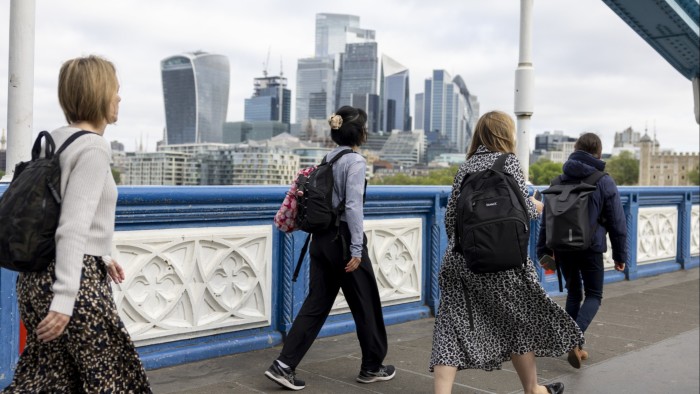Stay informed with free updates
Simply sign up to the UK employment myFT Digest — delivered directly to your inbox.
Wage growth accelerated at the end of last year, according to official data that economists said would reinforce the Bank of England’s gradual approach to cutting interest rates.
Average weekly earnings in the three months to December, excluding bonuses, were 5.9 per cent higher than a year earlier, and up from 5.6 per cent in the three months to November, the Office for National Statistics said on Tuesday.
The figure was in line with the expectations of economists polled by Reuters.
Wages growth was fastest in the private sector, a key measure for the BoE, where average earnings, excluding bonuses, rose 6.2 per cent. Public sector wages grew by 4.7 per cent in the period. The BoE had forecast private sector wage growth of 6.3 per cent for period.
The upward pressure on pay came as separate ONS figures showed the jobs market was more resilient than expected in December, with the decline in payrolled employment revised to 14,000 from an initial estimate of 47,000.
Early estimates for January showed payrolled employee numbers were up 21,000 from December. Vacancies ticked up to 819,000 in the three months to January from a recent low of 814,000 in the three months to November, ONS figures showed.
The jobs figures are closely monitored to assess the impact of Rachel Reeves’ October Budget on the labour market. The chancellor increased employers’ national insurance contributions and raised the minimum wage.
“A stabilisation in employment and very strong wage growth in the December/January labour market report support our view that inflation will be higher than most expect this year,” said Andrew Wishart, economist at Berenberg bank.
According to levels implied by swaps markets, traders expect the BoE to deliver two further quarter-point cuts this year. Following Tuesday’s data, traders scaled back bets on a third cut to under 30 per cent from 50 per cent. Following the data, yields on two-year gilts, which are sensitive to interest rate expectations, rose 0.04 percentage points to 4.24 per cent. Sterling was little changed at $1.261.
The BoE’s cut this month was its third since the summer of 2024, and the central bank has said it would take a “careful” approach to further cuts as it tries to balance persistent price pressures and lacklustre growth.
The economy expanded by just 0.1 per cent in the final quarter of 2024 after registering no growth in the previous quarter.
Several surveys, including the S&P Global purchasing manager indices, have reported that companies are cutting jobs ahead of the increase in national insurance contributions and higher minimum wage, which come into effect in April.
Rob Wood, economist at the consultancy Pantheon Macroeconomics, said “employment is holding up better than some dire business surveys like the PMI, suggesting they are too gloomy, so we are unconvinced that pay prospects are likely to suddenly ease”.

According to the ONS’s labour force survey, the unemployment rate held at 4.4 per cent in the final quarter of the year compared with the 4.5 per cent expected by economists. The ONS has said it is overhauling the survey because of a low response rate.
Labour productivity — or output per hour worked — fell 0.8 per cent in the final quarter of 2024, the fifth straight contraction, according to a separate ONS release also published on Tuesday.
Pay growth outpaced inflation with real wage growth rising by an annual rate of 2.5 per cent in the three months to December, the fastest pace since 2021 and the 19th consecutive month of real wage growth increase.
The latest snapshot of the labour market comes ahead of the release on Wednesday of January inflation data, which economists expect to show the annual price growth accelerating to 2.8 per cent in January, up from 2.5 per cent in December.
Additional reporting by Ian Smith in London


